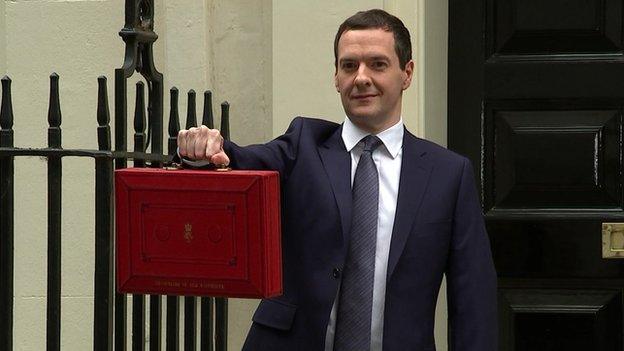Budget to have Northern Ireland welfare reform impact
- Published
- comments

George Osborne made only a glancing reference to Northern Ireland during his budget
George Osborne made only a glancing reference to Northern Ireland and the government's hopes of delivering the Stormont House Agreement.
But his budget promises to have an impact on the chances of the Stormont politicians' extricating themselves from their current welfare reform trap.
MLAs won't have to give their approval to the chancellor's limit on child tax credits, as taxation remains a Westminster responsibility.
However other proposals, such as the planned reduction in the benefits cap to £20,000, are devolved. Because of the stand-off over previous welfare changes, Northern Ireland has not yet implemented the existing £26,000 cap.
So a £20,000 cap would either require a Stormont deal - which is hard to envisage - or direct legislation by the Northern Ireland Secretary Theresa Villiers.
Predictably, nationalists have criticised the child tax credit changes. Less predictably, the DUP is also unimpressed.
East Antrim MP Sammy Wilson believes introducing a two tier system for families in London and elsewhere is a "first step towards the regionalisation of benefits" which would be "detrimental to those of us who represent poorer regions".
Given the low pay rates amongst much of the Northern Ireland workforce, you might think the increase in the minimum wage would be welcomed by all sides.
But Sinn Féin's Daithi McKay criticised the planned rate announced by the chancellor insisting it wouldn't protect working families.
So whilst Ms Villiers may point out that the budget has put money in the pockets of 700,000 people in Northern Ireland, it doesn't look like it will make her job of trying to resuscitate the Stormont House Agreement any easier.